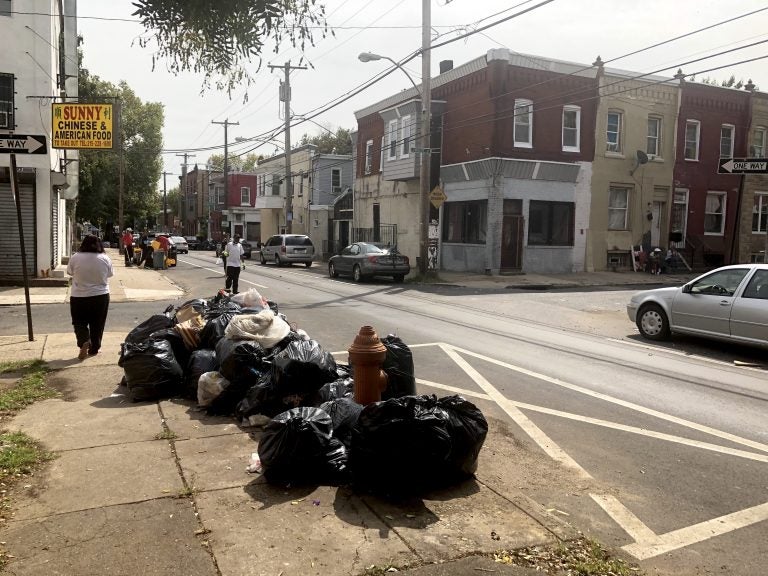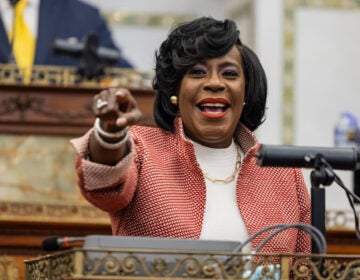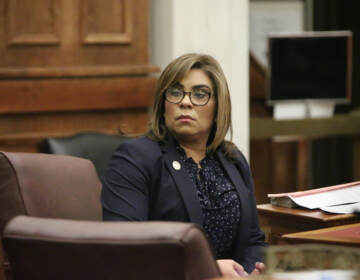9 Philadelphians tell Mayor Kenney how to clean their neighborhoods
Philadelphians have a number of neighborhood-specific suggestions how Mayor Kenney can make the streets cleaner.

Street cleaners organized by the Black Male Community Council of Philadelphia work on a North Philadelphia block. (Black Male Community Council of Philadelphia)
Philadelphia erupted with a range of emotions when Mayor Jim Kenney announced that he plans to bring back street sweeping to the entire city by the end of his second term in 2023.
We will continue to ramp up illegal dumping enforcement and build on our successful street sweeping pilot program by expanding street cleaning to every neighborhood by 2023. Yes, you read that right, EVERY neighborhood. #PHL2020
— Jim Kenney (@PhillyMayor) January 6, 2020
Joy, frustration, skepticism, some confusion and many, many other thoughts swept the internet.
While Kenney and his administration haven’t hashed out the details quite yet, his promise is clear: Street sweeping in every neighborhood. And yes, the program will “require folks to move their cars,” Kenney said, although probably not in all parts of the city, administration officials say.
Philadelphia Managing Director Brian Abernathy told PlanPhilly that the city will be doing research to determine the best way to meet the different cleaning needs of Philly’s many diverse neighborhoods. We talked to nine Philadelphians about their ideas for making the program work in their neighborhoods.
Communication matters – Oskar Castro, Elmwood Park
Castro used to see sweeping trucks pass his area a few years ago, and they wouldn’t actually sweep anything because parked cars were in the way. While Oskar has no problem moving his car for a sweeping program, he foresees this being an issue in his Southwest neighborhood, Elmwood Park. “I don’t see the city doing an effective job of communicating with my neighbors who don’t have English as a first language. I can imagine any of my African, Southeast Asian, or Middle Eastern neighbors coming out of their homes to go to work, only to find that their car had been towed because they were unaware of an ordinance mandating that they move their car.”
Add an extra day of trash pickup in some areas – Stanley Crawford, North Philadelphia
Stanley Crawford is under no illusion that any single city program can solve the problem of dirty streets. The North Philadelphia native, along with a crew of fellow Black men, takes brooms and big trash cans to neighborhood streets six days a week. “It’s unbelievable when you have boots on the ground in certain areas,” said Crawford, founder of the Black Male Community Council of Philadelphia, a nonprofit group. “It is filthy … I don’t want to diminish the mayor’s effort but it is a drop in the ocean.”
Adding mechanical brooms will be a help, but Crawford suggests the city consider also adding a second day of trash pickup in some areas, and continuing to crack down on short dumping.
“When you come in with the sweepers that’s great, but we need much more than that,” he said. “Our women, children and elderly should not have to live in filth.”
Whatever happens, please no leaf blowers – Jacelyn Blank, Kensington
Jacelyn Blank lives in Kensington and has seen the dangers of leaf blowers first-hand. Leaf blowers are “just blowing needles and dirt around putting people more at risk of getting stuck with a needle, ingesting dirt contaminated with hepatitis A, and making lead dust airborne,” she said over email. This puts employees at risk and the people around them too.
“Brooms are cheap, easy, don’t cause pollution and are highly effective,” she added.
Timing is everything – Jon Geeting, Fishtown
Communicating whatever alternate-parking model is eventually adopted for the program is key to its success, and so is when cars are required to be moved and when the sweeping actually happens.
“It would have to start in the morning after people have left for work on weekdays,” said Jon Geeting who lives in Fishtown. Maybe 9 a.m., he suggested, since that’s when parking spots start to open up.
In terms of when sweeping should occur during the week, Geeting was very passionate about the importance of doing it after garbage day. “Based on my observation, the dirtiest day in the neighborhood is always after trash pickup,” he said. Things get knocked around, left behind and it’s always a mess, he said. “If they can do trash pickup and recycling, they can do this,” he added.
Bring the sweepers, and more trash cans too – Marci Stroman, Nicetown
Many folks complained online about the intense litter on Philly streets. How can we be cleaner if we don’t have anywhere to throw things out? The solution needs to be comprehensive. That means increasing the number of trash cans in addition to implementing street sweeping.
Yes we need this! I remember the trucks coming through when younger and the blocks being cleaner. I believe this will help people be more aware. We also need trash cans too! Lots of trash cans.
— Bleu_grl (@Bleu_grl) January 6, 2020
We need to figure out ticketing and enforcement, Anna Perng, Chinatown
Anna Perng is excited for the city to step up and roll out the sweepers, but she has many concerns too, particularly when it comes to parked cars blocking their routes. “There will clearly need to be a lot of work done with pro-car constituents who have become acclimated to getting their way,” she said. But it’s more about the city systems rather than the individuals, in her mind.
Cars have been ticketed for blocking street sweepers that never showed and tickets often go unpaid, so it’s critical for the city to figure out a successful approach that includes the Philadelphia Parking Authority. “I would really hate to see a citywide program get blamed for over-ticketing or inconsistent ticketing done by a state parking enforcement agency, ” she said. “I hope all elected officials will have the political will to see this through.”
More people, fewer trucks – Kyle Cassidy, West Philly
While the street sweeping conversation seems to focus primarily on mechanical trucks and leaf blowers, Kyle Cassidy thinks the city should be considering an alternative approach. “The University City District has teams of Public Space Maintenance crews who clean up trash along certain blocks, paid for by business owners, and I think that’s really the only way to address this problem,” he said.
An issue with trucks is that they only get the side of the streets, which is why Kyle thinks working with people might be more worthwhile since that process can ensure that both sidewalks and streets are kept clear.
I would much rather a University City District style team of sidewalk trash collectors. Cleaning the street side of the curb only with a giant truck is a waste of time, energy and giant trucks.
— kyle cassidy (@kylecassidy) January 7, 2020
Use the program to create jobs in communities – Susan Nuessle, West Passyunk
As city officials have pointed out, every neighborhood has unique needs, so a one-size-fits-all approach to street sweeping isn’t going to work, said Susan Nuessle, a resident of West Passyunk.
“Make [the program] more neighborhood-based and see if community associations or neighborhood programs could employ people,” she suggested. This would ensure that keeping our streets clean is a collaborative process and is specifically designed for each individual neighborhood.
Uh, can we hurry this up? – Joe Cox, Bella Vista
The thought of waiting four years for street sweeping to officially commence was simply too long of a wait for many Philadelphians, Joe Cox included.
Yes now, not 2023..
— Joe Cox Activist for an Equitable Philadelphia (@Joecoxactivist) January 6, 2020
WHYY is your source for fact-based, in-depth journalism and information. As a nonprofit organization, we rely on financial support from readers like you. Please give today.








